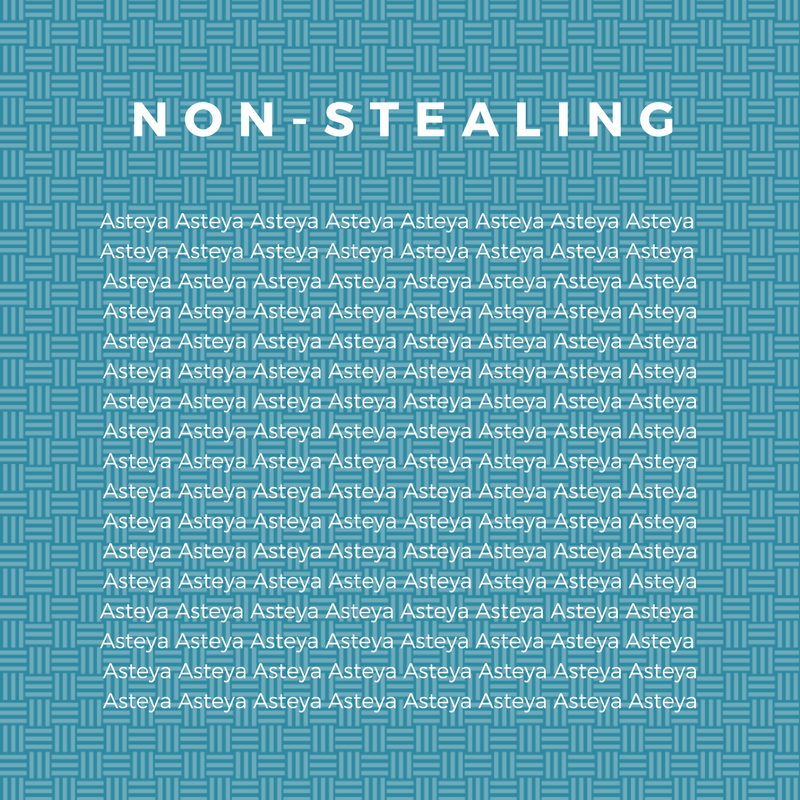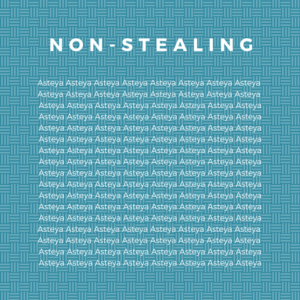
 The Yoga Sutras of Patangali (circa 200 AD) are a rich resource for self-reflection. This year, because of their great value in supporting equanimity and balance in a world that feels increasingly chaotic, I’m returning to the wisdom of the Yamas: five observances for living an ethical life in society.
The Yoga Sutras of Patangali (circa 200 AD) are a rich resource for self-reflection. This year, because of their great value in supporting equanimity and balance in a world that feels increasingly chaotic, I’m returning to the wisdom of the Yamas: five observances for living an ethical life in society.
Practicing the Yamas helps me center and ground. As a lighthouse in a storm, when I need guidance, I turn to these simple yet profound teachings. Thus far in 2018, the Resilience blog has explored the first two yamas: non-violence (ahimsa) and truthfulness (sayta).
In this blog, we focus on non-stealing, or, in Sanskrit, asteya.
Let’s state upfront that non-stealing means just that. Greed and gluttony, two of the seven deadly sins, are universally considered unethical. But what are other, more subtle aspects of asteya that can give us insight?
Non-stealing and the Environment
Consider the natural resources of our planet, including the air we breath. Non-stealing when addressing the environment means we do not plunder natural resources and we care responsibly for our planet—not only during our lifetime, but for future generations.
Non-stealing in Communication
How often do we interrupt or finish others sentences? It’s subtle, but this, too, is a form of stealing, as we rob others of the opportunity to fully express themselves.
We also unconsciously steal peace from those around us by needlessly speaking. Keeping one’s mouth shut is a learned skill, as many people are uncomfortable with silence and the anxiety it creates. Silence truly is golden, but embracing that concept in a noisy world is an acquired ability.
Non-stealing as a Consumer
We may repeatedly purchase material items or foodstuffs that far exceed our requirements, particularly if our basic survival needs are met. When we buy without need, we engage in a form of stealing. Consider donating or sharing what you may be inclined to purchase but don’t truly need.
While we may obey the societal law of non-stealing and strive to live a measured life, the temptation is still great for many of us to tend towards excess. Often there is an innate human desire to fill the inner places where we may feel empty or less-than.
This is a common trait worth acknowledging. Who hasn’t felt, “If I only had that, I would be happy.” Or, “If only I had X,Y, and Z, my life would be perfect.”
Such thoughts often lead to suffering. The second Noble Truth in Buddhism teaches that desire causes suffering. An interesting distinction in Buddhism is that it isn’t the objects themselves that cause us pain, but rather our desire for them.
However, for the purposes of this blog and the vast topic of non-stealing, I’d like to focus on the aspects of asteya as it relates to time.
Stealing time
Time is the most precious thing we have. And it matters not whether we are rich, poor, young, or old; we cannot make more time. It can’t be bought, paused, or replayed. Time marches on, and when this moment has passed, it is gone forever.
Every year, when I ask my husband what he wants for his birthday, he jokingly replies, “Another hour in the day and another day in the week.” If only such a gift were possible.
Perhaps because time is so fleeting, nothing feels more piteous to me than wasting it when it might otherwise be wisely used. That surely doesn’t mean every moment needs to be go-go or planned. What I speak of here is intelligent, mindful use of time.
Non-stealing, when it comes to the topic of time, means learning how to be fully in the moment. When we spend our days rehashing the past and continually striving towards the next moment, we are literally stealing time from ourselves.
In terms of non-stealing and time, the highest practice is to be present in the here and now. It is an elevated skill, but one worth cultivating if we are to prevent the present moment being stolen.
In my coaching practice, when a client is struggling with time management, it can be a revelation for them to discover how making time for certain activities creates more space in their schedules.
Practices such as meditation, time in nature, or self-reflection are all forms of non-stealing from the present. By their very nature, these practices require one to anchor in the present moment. The overall result is often a greater feeling of spaciousness—which can lead to more skillful time management.
Discerning how to spend our time
Another aspect of non-stealing and time applies to our work with others (paid or unpaid).
One of my greatest joys remains a gentle asana and philosophy class I taught for six years at a non-profit for the visually impaired. I still relish it as one of the richest experiences of my life. Time stood still there because it was a joyous, rich exchange of ideas and energy. I left each class with renewed drive. While I never received a penny for that work, it continues to enrich my life as I teach and mentor others and impart what I learned there.
Conversely, a time may come when our services (paid or unpaid) may not be serving the highest purpose. It may feel like time is slipping through our fingers. It may feel like we are wasting our time. We may feel angry or frustrated. Listen to those inner voices as respected messengers of information.
Part of our job, then, is responsibility and respect for our time. We cannot expect the recipients of our talents or efforts to monitor how we feel. They cannot read our minds or our hearts. If we feel precious time is being frittered or stolen away, we are violating this yama. To honor non-stealing, we must begin an honest inquiry, and perhaps may need to walk away.
Time is precious. Guard it wisely and give it freely. But to honor asteya, be clear about your intentions. To get you started, here are a few questions to consider:
- Are there circumstances in your life where you might safeguard and use time more wisely?
- What are the ways you use time now that make you feel rich and abundant?
- How can you increase those moments?